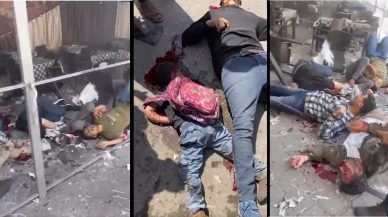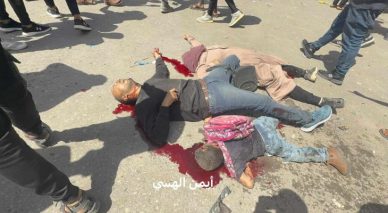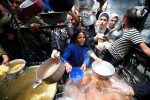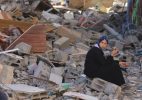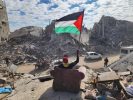GAZA, (PIC)
In most parts of the world, people eagerly await the winter season, filled with cherished memories and traditions, hoping for quiet days and warm family gatherings. But for the people of Gaza, winter brings anxiety and fear. They brace for rainstorms while enduring displacement and living in tents due to ongoing Israeli aggression.
A year has passed since the relentless war on Gaza began, and most residents are living in what they call “tents,” though they fall far short of that description. These makeshift shelters are often made from cloth and nylon, with the fortunate few having their tents covered with tarps or receiving rare aid in the form of ready-made tents.
For this reason, winter has become a nightmare haunting Gazans even before the season arrives. Recent light rains at the start of autumn have already sounded alarms, as tents flooded, were torn apart by winds, and their many flaws became glaringly apparent.
To make matters worse, the prices of materials that could help repair these tents and make them somewhat suitable for the coming winter have skyrocketed. According to a report by the Palestinian Information Center, the cost of tarps ranges from 400 to 600 shekels (with 1 USD equaling 3.8 shekels), while nylon sheets can cost between 10 and 30 shekels per meter—prices ten times higher than normal.
Winter: A dreadful reality
Abu Mohammed, a father of three sons and four daughters from Rafah, currently lives in a 20-square-meter tent made from cloth and nylon sheets. Wandering through the market in Deir al-Balah, he searches desperately for materials to repair his tent and prepare for the upcoming rainstorms and harsh winds.
He tells our reporter, “Anyone trying to fix or build a new tent needs a loan,” referring to the exorbitant costs involved. He adds, “Everything is so expensive, and with the current situation, the lack of work, and our inability to earn a living, we can’t keep up with these prices.”
Abu Mohammed worked as a construction worker before the ongoing brutal war. Even then, his income barely covered the necessities. After losing his job, he now relies on rare aid, which has become even scarcer due to the Israeli blockade, particularly after the military offensive in Rafah and the closure of the Rafah border crossing.
Loss of loved ones and the search for shelter
The situation is not much different for Umm Manal, who lost her husband and father of her five children in an Israeli airstrike that targeted the street outside their home in the Nuseirat refugee camp in central Gaza.
After fleeing to the town of al-Zawaida to escape continuous shelling near the so-called “Netzarim Axis,” Manal and her children found themselves exposed to the weather elements in a large refugee camp. They spent the summer under cloth without any roof—a situation that, while barely manageable in the heat, is unthinkable in the approaching winter.
She says, “My husband, who was martyred, used to work for daily wages. Since his death, we’ve had no provider, and we rely on the food aid from a nearby soup kitchen. But we have no idea how to even build a small tent to shield us from the winter’s cold and rains, which have already begun this year.”
A few days ago, heavy rains flooded all her belongings, forcing them to flee to a nearby overcrowded tent until the rain subsided.
The widowed mother explains that she has visited many organizations in search of a tent or anything to help her build a small shelter, but all she received were promises contingent on Israel allowing aid, particularly tents and tarps, to enter. She says she can endure hardship, but questions whether the winter rains and cold will give them any respite in the coming weeks.
Worn-out tents and the blockade on new ones
Gaza’s Government Media Office (GMO) reported that 100,000 out of 135,000 tents for displaced people have become unusable due to wear and tear. These tents, made from wood, nylon, and cloth, have deteriorated under the intense sun and harsh climate of Gaza, leaving them completely unfit for use, especially after nearly a year of displacement in inhumane conditions.
In numerous official statements, the GMO highlighted how Israeli authorities have blocked the entry of thousands of new tents into Gaza, exacerbating the dire situation.
A humanitarian SOS
In response, the GMO issued an urgent humanitarian appeal to save the two million displaced residents before winter arrives and their tents fall apart. They warned of a looming humanitarian disaster for the displaced population.
It pointed out the existence of 543 shelter centers across Gaza, filled with people forcibly displaced by Israeli military operations. The number of displaced persons continues to grow daily, reaching nearly 2 million across various parts of the Gaza Strip.
The GMO called on international organizations and related global institutions to “break their silence and provide immediate, urgent relief to the displaced who are in dire need of proper shelter to protect them from the winter cold.”
Efforts hampered by major challenges
The United Nations Relief and Works Agency for Palestine Refugees (UNRWA) has also highlighted the severe challenges it faces in delivering essential winter supplies to Gaza.
In a previous statement, UNRWA noted that all humanitarian agencies are struggling to bring in necessary materials. However, it emphasized that once supplies do arrive, they will be distributed immediately to those in need.
UNRWA said, “We are doing everything possible to deliver critical winter supplies to Gaza, including plastic sheeting, tents, mattresses, mats, blankets, hygiene kits, and other essentials.”
It urged an end to the destruction of homes and shelters, calling for the reopening of border crossings to allow the delivery of essential supplies to thousands of needy families. UNRWA stressed the importance of a ceasefire to ensure the safe and sustainable delivery of aid and give families the opportunity to rebuild their lives in safety.




